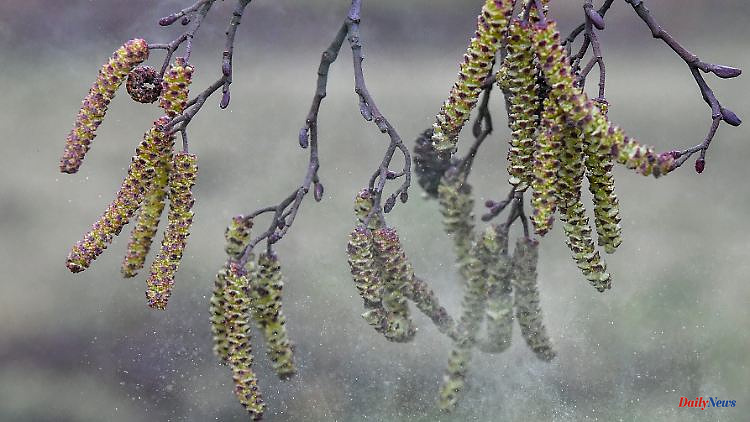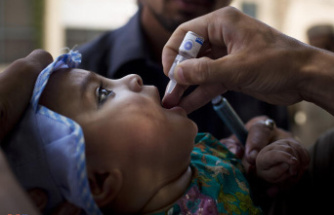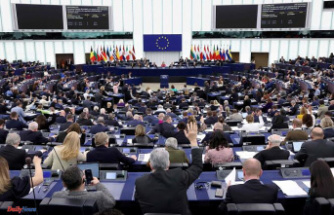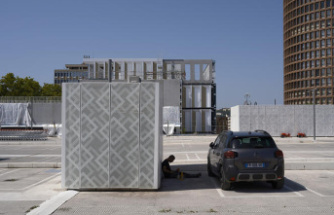Climate change and global warming affect the pollen count. This is especially felt by allergy sufferers. On the roof of the Charité in Berlin, specialists are investigating the development of the pollen count and have various approaches that could help allergy sufferers.
winter break? Are you kidding me? Are you serious when you say that. Throughout the year, Matthias Werchan and colleagues regularly climb onto the roof of the Charité dermatology clinic in Berlin-Mitte. Not because of the view. Their destination is the pollen trap there, which constantly sucks in the air of the capital at a height of 23 meters. Existing pollen and other particles are fixed on a band inside the green device. Graduate landscape ecologist Werchan later analyzes the catch under the microscope. It can be read, for example, on which day at which time which pollen was in the air, he said.
Werchan works for the German Pollen Information Service (PID) Foundation, which has been operating a measuring network to examine pollen concentrations in the air since 1983. The results from 35 to 40 locations nationwide are included in pollen forecasts by the German Weather Service (DWD). Even if it's only February and still partly cool: According to the experts, the 2023 pollen season has begun.
And with a "bang" on New Year's Eve and New Year's Day, when it was up to 20 degrees warm, said Werchan. Due to lower temperatures since mid-January, the situation has now calmed down somewhat. For some western parts of the country, however, the forecast for last Tuesday already provided for a medium level of hazel and alder pollen.
The PID chairman, allergist Karl-Christian Bergmann, recalls: We live in times of climate change, which changes the behavior of the pollen. The experts observe that the times when the last pollen of the previous season disappears and the first of the new season appears almost overlapping. In many places, more days with peak pollen concentrations were also observed, said Bergmann. One possible explanation is that plants release more pollen when they are stressed.
A new version of a PID pollen count calendar, which will appear next week, still shows a small gap in November with no possible pollen occurrence. Adjustments were also made based on data from the years 2016 to 2021: The alder, for example, brought its main flowering period forward by nine days compared to the previous calendar based on the period 2011 to 2016.
The allergy experts express criticism that tree species are being replanted in cities that can cause problems for allergy sufferers, such as purple alder. It was said that these let their pollen fly around Christmas time, weeks before native alders.
Hay fever patients react overly sensitively to the actually harmless pollen. Possible symptoms include tears in the eyes, urge to sneeze, runny nose, cough and exhaustion. Those affected can use nasal sprays, eye drops and tablets to combat the symptoms. An immunotherapy with injections or tablets, the so-called hyposensitization, starts at the cause.
Sometimes those affected are advised to travel when their allergies are at their peak. Torsten Zuberbier, Chairman of the European Allergy Foundation Ecarf, on the other hand, would like to create a more allergy-friendly environment on site. There is potential in the greening of cities and in construction. For example, allergy-causing substances could also be found in wall paints, carpets and adhesives.
According to the Robert Koch Institute, the frequency of allergic diseases has increased sharply in countries with a Western lifestyle since the 1970s and has recently stabilized at a high level. The severity of allergic reactions is also increasing, according to Zuberbier. Predisposition plays an important role in allergies, but there are many other factors. It's also our fault, said Zuberbier: The increase in allergies is also due to the modern lifestyle. One keyword: environmental pollution. Pollen and particulate matter together led to more complaints, Bergmann said.
What could help those affected? Allergies are already very treatable, but they are often trivialized, said Zuberbier. A very large proportion of those affected are not treated properly. The professionals don't just think about medicines. Products for allergy sufferers are repeatedly tested in a so-called Ecarf pollen chamber, a container on the Charité site. Currently, for example, air filters that are worn around the neck.
In the chamber, test persons in protective suits are exposed to certain pollen under observation, usually for about two hours. In the room, it should be possible to check very precisely which amount of pollen triggers which symptoms - and what changes certain products or medicines have. Technical manager Pierre Derfling said that the benefits of masks had already been tested in the chamber. Do they also protect allergy sufferers? "In short: yes," says Derfling.












